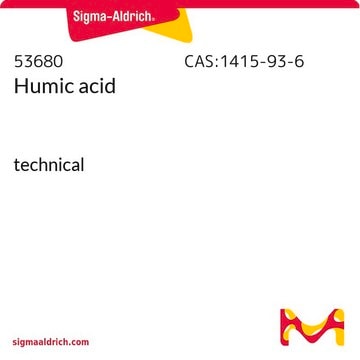403040
Tannic acid
ACS reagent
Synonym(s):
Gallotannin, Tannin
About This Item
Recommended Products
grade
ACS reagent
Quality Level
autoignition temp.
980 °F
ign. residue
≤0.5%
loss
≤12.0% loss on drying, 105°C
mp
218 °C (lit.)
cation traces
Zn: ≤0.005%
heavy metals: ≤0.003%
SMILES string
Oc1cc(cc(O)c1O)C(=O)Oc2cc(cc(O)c2O)C(=O)OC[C@H]3O[C@@H](OC(=O)c4cc(O)c(O)c(OC(=O)c5cc(O)c(O)c(O)c5)c4)[C@H](OC(=O)c6cc(O)c(O)c(OC(=O)c7cc(O)c(O)c(O)c7)c6)[C@@H](OC(=O)c8cc(O)c(O)c(OC(=O)c9cc(O)c(O)c(O)c9)c8)[C@@H]3OC(=O)c%10cc(O)c(O)c(OC(=O)c%11cc(O)c(O)c(O)c%11)c%10
InChI
1S/C76H52O46/c77-32-1-22(2-33(78)53(32)92)67(103)113-47-16-27(11-42(87)58(47)97)66(102)112-21-52-63(119-72(108)28-12-43(88)59(98)48(17-28)114-68(104)23-3-34(79)54(93)35(80)4-23)64(120-73(109)29-13-44(89)60(99)49(18-29)115-69(105)24-5-36(81)55(94)37(82)6-24)65(121-74(110)30-14-45(90)61(100)50(19-30)116-70(106)25-7-38(83)56(95)39(84)8-25)76(118-52)122-75(111)31-15-46(91)62(101)51(20-31)117-71(107)26-9-40(85)57(96)41(86)10-26/h1-20,52,63-65,76-101H,21H2/t52-,63-,64+,65-,76+/m1/s1
InChI key
LRBQNJMCXXYXIU-PPKXGCFTSA-N
Looking for similar products? Visit Product Comparison Guide
General description
Application
- Synthesis of ferric tannate complexes by reacting with metallic iron.
- As a protein deproteinizing agent in genomic and plasmid DNAs preparation.
- As a reductant in the synthesis of metal nano particles.
Storage Class Code
11 - Combustible Solids
WGK
WGK 2
Flash Point(F)
390.2 °F
Flash Point(C)
199 °C
Personal Protective Equipment
Regulatory Listings
Regulatory Listings are mainly provided for chemical products. Only limited information can be provided here for non-chemical products. No entry means none of the components are listed. It is the user’s obligation to ensure the safe and legal use of the product.
JAN Code
403040-500G:
403040-VAR:
403040-100G:
403040-50G:
403040-BULK:
Choose from one of the most recent versions:
Certificates of Analysis (COA)
Don't see the Right Version?
If you require a particular version, you can look up a specific certificate by the Lot or Batch number.
Already Own This Product?
Find documentation for the products that you have recently purchased in the Document Library.
Our team of scientists has experience in all areas of research including Life Science, Material Science, Chemical Synthesis, Chromatography, Analytical and many others.
Contact Technical Service






